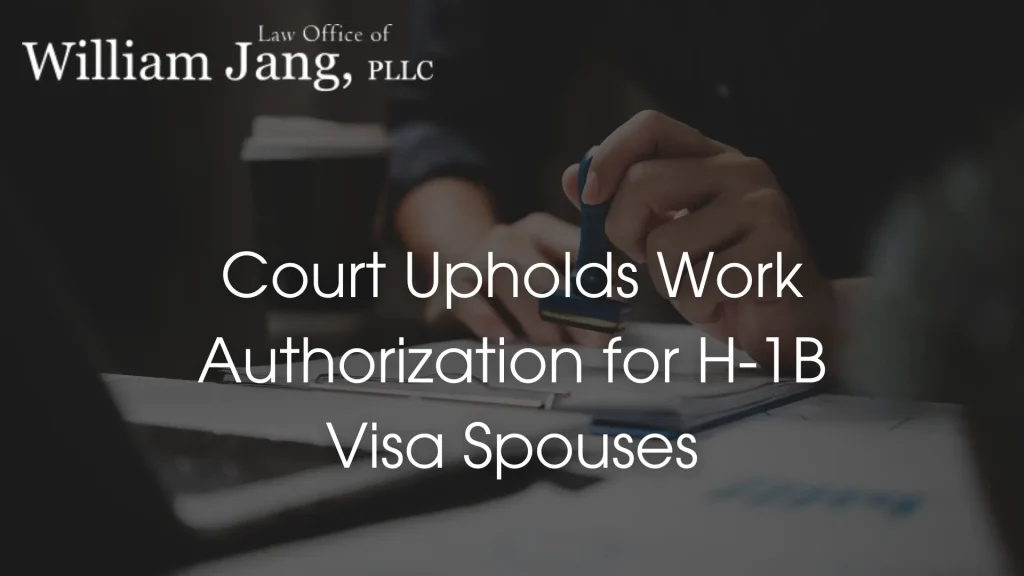
A recent ruling by the D.C. Circuit has affirmed the validity of amended regulations issued by the Department of Homeland Security nearly ten years ago that extended employment authorization to certain spouses of H-1B visa workers pursuing lawful permanent resident status in the U.S. This decision reinforces the rights of H-1B visa spouses, allowing them greater opportunities. At the same time, their partners work in the country. For many, being an H-1B visa spouse means supporting their family and contributing to the economy.
Understanding the Background
The U.S. Court of Appeals for the D.C. Circuit recently issued an opinion upholding the district court’s grant of summary judgment in a case challenging the ability of spouses of H-1B workers to seek employment in the U.S. In the mid-2010s, the Department of Homeland Security updated immigration regulations to allow dependent H-1B visa spouses who had entered the U.S. on an H4 visa to accept employment while living in the U.S. The Obama administration implemented the changes to provide a more accessible pathway for H-1B non-immigrants to seek lawful permanent residency in the United States.
D.C. Circuit Affirms Rules Permitting H-1B Spouses Temporary Work Authorization
However, Save Jobs USA, an organization of I.T. workers, filed suit to challenge the regulations, arguing that H-1B workers and their spouses had taken jobs that qualified U.S. citizens could fill. Save Jobs argued that DHS exceeded its authority in implementing the regulations allowing spouses of H-1B workers to seek employment in the U.S. However, the district court ultimately granted summary judgment to the federal government.
During Save Jobs’s appeal from the district court’s grant of summary judgment, over 40 companies, including Google, Microsoft, Amazon, Apple, and Intel, filed amicus briefs with the D.C. Circuit supporting the regulations allowing spouses of H-1B visa holders to seek employment. Although the Supreme Court had recently overruled Chevron’s deference that required federal courts to defer to federal agencies’ interpretation of unclear statutes, the D.C. Circuit concluded that the end of Chevron’s deference did not undermine the district court’s judgment and ruled that the Immigration and Nationality Act provided DHS with the authority to issue employment authorization to spouses of H-1B workers.
Specifically, DHS asserted that its authority for the amended regulations came from §102 of the Homeland Security Act of 2002, §103(a) of the Immigration and Nationality Act, which authorized the Secretary of Homeland Security to administer and enforce immigration and nationality laws, and §274A(h)(3)(B), which granted the Secretary the authority to extend employment authorization to noncitizens in the U.S.
Why Extend Employment Authorization to Spouses of H-1B Visa Holders?
 DHS amended the regulations to extend employment authorization to certain spouses of H-1B workers for several reasons. First, allowing H-1B visa spouses to seek employment in the U.S. could reduce the financial burdens that non-immigrant families face. In contrast, the H-1B spouse transitions from non-immigrant to lawful permanent resident status.
DHS amended the regulations to extend employment authorization to certain spouses of H-1B workers for several reasons. First, allowing H-1B visa spouses to seek employment in the U.S. could reduce the financial burdens that non-immigrant families face. In contrast, the H-1B spouse transitions from non-immigrant to lawful permanent resident status.
DHS hoped that this change would eliminate some of the disincentives that H-1B workers faced when transitioning from non-immigrant to lawful permanent resident status, which caused some H-1B families to abandon their efforts to seek lawful permanent residence and leave the U.S. DHS also noted that providing means for H-1B families to stay in the U.S. At the same time, they pursued lawful permanent residency could minimize disruptions for businesses that relied upon H-1B workers.
Companies that rely on H-1B workers may also have an easier time attracting talent by eliminating the potential financial burdens those workers and their families might face if H-4 spouses had to wait years for employment authorization while pursuing lawful permanent residency.
How Can an H-1B Visa Spouse Work?
The recently upheld regulations extend employment authorization eligibility to qualifying H-4 dependent spouses of H-1B non-immigrants seeking employment-based lawful permanent resident status. To qualify, the H-1B visa spouse must have an approved Form I-140 Immigrant Petition for Alien Worker or have received H-1B visa status under the American Competitiveness in the Twenty-First Century Act of 2000, as amended by the 21st Century Department of Justice Appropriations Authorization Act.
An eligible spouse who wishes to work must file Form I-765, Application for Employment Authorization, with supporting evidence of their eligibility. If U.S. Customs and Immigration Services approves a spouse’s Form I-765, it will issue the spouse a Form I-766, Employment Authorization Document EAD, which permits the spouse to seek and accept employment in the U.S.
Contact an Immigration Attorney Today
When you’ve come to work in the U.S. on an H-1B visa, your spouse may also have the right to obtain work authorization to seek employment in the U.S. Contact the Law Office of William Jang, PLLC for an initial consultation. Call us at (512) 323-2333 to discuss your legal options with a knowledgeable Austin non-immigration employment-based visa lawyer.
Related Posts:
Is the Situation at the Border Impacting the Availability of Visas and Green Cards?










